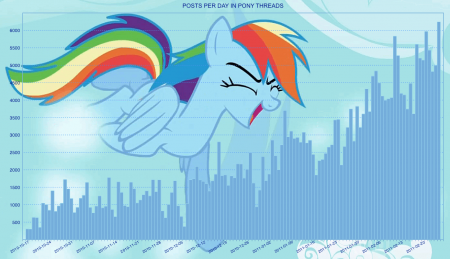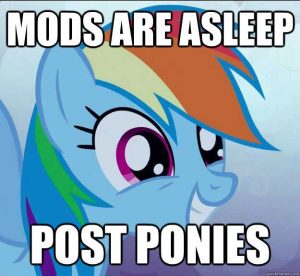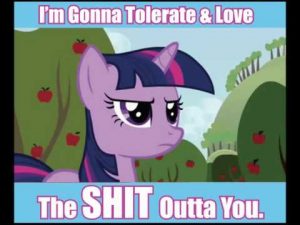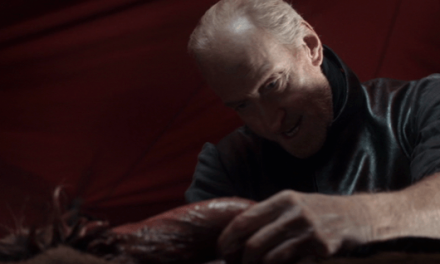From February 26th to March 1st 2011 a war was fought on the pages of the image sharing website 4chan (“home to numerous boards where anonymous posters discuss everything from anime, to sports, to paranormal activity, to torture porn”[1]). While short-lived, and practically invisible to those not involved with the website, this ‘Pony War’ would help spring a particular fandom into internet infamy; Bronies, the adult make fans of My Little Pony: Friendship is Magic (2010-).
In October 2010 an article was posted to 4chan’s comics and cartoons board entitled ‘The End of the Creator Driven Era in TV Animation’[2] which mentioned the newly aired MLP: FIM. The goal of the article, which was originally posted on Cartoon Brew, was to criticise The Hub’s (Hasbro and Discovery’s joint television channel) launch line-up and castigate Margaret Loesch (the Chief Executive Officer of The Hub) as creating cartoon programming that would merely tick “committee-driven mandates” rather than creating engaging, thoughtful shows. The article argued that this new age of cartoon programming would:
Increasingly rely on worn but reliable formulas. [Networks] will demand only the surest bets–Looney Tunes revivals, TV series based on feature film characters (The Penguins of Madagascar is already on Nick and Kung Fu Panda: Legends of Awesomeness is coming soon), shows based on live-action films (Napoleon Dynamite is headed to Fox), and the toy-based ideas that comprise the largest portion of the Hub’s animation programming.[3]
The article, released a mere week after The Hub had launched, was quickly posted to 4chan’s comics and cartoons board.
Nanashi Tanaka, a 4chan user and Brony, has described the role the article had in bringing MLP:FIM to the attention of 4chan users. “It was pretty alarmist, but it also got a lot of us going over to watch the show,” he said. “We were going to make fun of it, but instead everybody got hooked. And then the first pony threads exploded.”[4] Another Brony Alex Davidson shared that experience when he started watching MLP:FIM, “I was expecting to hate it. I figured it would be along the same lines as watching Barney or something, but it turned out to be something totally different.”[5] The flash animation, quirky characters and humorous storylines were all factors that gained MLP:FIM fans on 4chan, with one Brony, Riley Kilo, stating that they were made aware of the programme because “people were attracted to the cuteness of the pony avatars” and recommended the programme to other fans of cartoons and animation.[6] Tanaka continues that “there were Bronies in just about every single group imaginable, from furries to Trekkies to otaku… You can see how word of pony ended up spreading to every corner of the Internet.”[7] News of MLP:FIM had spread throughout 4chan and by February 2011 there were 6000 posts about the programme being posted on the discussion boards daily (Fig. 1).[8]
The MLP:FIM discussion soon moved to the /b/ board on 4chan, home of random content and notorious as “the Internet’s ultimate id for its violent and sexual content.”[9] This is where Bronies first started being targeted by online trolls, defined as people who submit deliberately inflammatory articles to an internet discussion, and 4chan users who opposed adult men watching a cartoon aimed at young girls. Kilo states that the proliferation of Bronies, and their vocal support for the programme, was polarising on 4chan. He said that “there were healthy conversations about how cool the show was, or the importance of nostalgia… And then on the other hand there were pictures of big black dicks and dead horses.”[10] Margaret Hartmann also describes the volatile reaction Bronies received on the /b/ boards, writing that:
Big-eyed, pastel-colored cartoon ponies who talk about friendship are the antithesis of everything /b/ stands for, and thus a civil war broke out on the boards. The denizens of /b/ fought back against the influx of ponydom with bannings and the usual photos of hardcore sex acts and dead things.[11]
This begun the 4chan ‘pony wars’, where those who disapproved of Bronies would try to shut pony threads down and began “spamming porn and gore in an attempt to dissuade people from posting.”[12] 4chan’s moderators officially took a stance in February 2011 by starting to “sage [shut down] pony threads and ban users who posted in them.”[13] To defend the ban they released the following statement: “Endless pony threads with no actual content other than reaction images. Go start your own pony image board”.[14] Tanaka noted that “[the mods] decided that the best solution to the combative atmosphere would be to ban ponies… Ponies’ became a banable word, and posting would get you a one-day ban from the site.”[15] Although a huge number of bans were issued to Bronies, it did not stop the pony threads. Ponies quickly became the subject of “Mods Are Asleep” threads (Fig. 2), and many Bronies were computer-literate men who were able to quickly circumvent the bans imposed on them Tanaka stated that “our saying was ‘Banned from /b/, back in 10 seconds
flat.’”[16]
While they received a lot of hostility and hate posts, the Brony audience did not respond to the trolls in kind. As with many internet groups, the Brony audience used catchphrases and memes such as “welcome to the herd” or “confound those ponies” to express their adherence to the audience and develop its culture. And during the ‘pony wars’ one meme in particular exploded in popularity and usage: “love and tolerate” (Fig 3.). Memes are an important part of an internet group as “they come to us framed by specific histories of use and meaning, and are products of specific ideological struggles,”[17] so the use of this particular meme as the Bronies’ main weapon and response to their ‘haters’ reveals how this audience was developing and creating its own identity during this time of tension and conflict.
The meme was developed and utilised around the time episode 5 of the series aired, titled ‘Griffon the Brush Off’, which dealt with themes of forgiveness and tolerance. Brony ‘Blasting Gravy’ notes that “it is easy to see how the love and tolerance philosophy came up early on. Perhaps the most important of these [episodes] is Griffon the Brush-Off.”[18] The meme was used in response to hate posts against MLP:FIM, as it would be posted multiple times on threads that criticised the show or Bronies. Another Brony stated that “at that time, it meant that no matter what, we are not afraid and ashamed to show we loved a show everyone thought was just for little girls.”[19] The show’s lessons about friendship and love became a tool by which Bronies could defend themselves “despite receiving lots of hate from trolls, fans [tried] to avoid being confrontational in an attempt to personify the message of kindness put forth by the show.”[20]
The ‘pony wars’ quickly died down, and the ban, which was established on February 26th 2011, was completely removed by March 1st 2011, after 4chan moderators admitted that the ban was not working. 4chan user Sam Levine noted that “My Little Pony is the only group to take on 4chan and win. 4chan once took on the F.B.I. and won. So you might say that My Little Pony is more powerful than the F.B.I.”[21]
The ‘pony wars’ were short and contained, but they were the first moment that the controversial Brony audience were introduced to the wider internet and have influenced their reception and standing ever since. It’s also interesting that a children’s cartoon programme sparked the largest uprising 4chan had ever seen and, to this date, the only war that 4chan has failed to win.
Claire Burdfield is a postgraduate researcher of Culture, Film and Media at the University of Nottingham. Her thesis, entitled ‘The Accidental Audience: Industrial Management of Unexpected Television Viewerships’ focuses on how the television industry manages audiences that engage with their programming that differ from the intended audience. She also works for the Children’s Media Conference and is a member of the BAFTA Youth Council.
Fotnotes:
[1] Una LaMarche. “Pony up Haters: How 4chan Gave Birth to the Bronies.” Observer Business & Tech, 9th August 2011. http://observer.com/2011/08/pony-up-haters-how-4chan-gave-birth-to-the-bronies/.
[2]Amid Amidi, “The End of the Creator-Driven Era in Tv Animation,” Cartoon Brew, http://www.cartoonbrew.com/ideas-commentary/the-end-of-the-creator-driven-era-29614.html.
[3]Ibid.
[4] LaMarche, “Pony up Haters: How 4chan Gave Birth to the Bronies.”
[5] Sadie Gennis. “Give Bronies a Break! In Defense of Adult My Little Pony Fans.” TV Guide, 31st July 2013. http://www.tvguide.com/news/bronies-my-little-pony-friendship-magic-1068692/.
[6]LaMarche, “Pony up Haters: How 4chan Gave Birth to the Bronies.”
[7] Ibid.
[8] The source for this image is the State of the Herd Report 2014, a report created by a collaboration between the University of Salem and the Brony Community. It collects survey results from over 18,000 participants to collect information about the Brony audience.
[9] LaMarche, “Pony up Haters: How 4chan Gave Birth to the Bronies.”
[10] Ibid.
[11] Margaret Hartmann “The Unlikely Origins of the Brony, or Bros Who Like ‘My Little Pony’.” Jezebel, 4th August 2011. http://jezebel.com/5827591/the-unlikely-origins-of-the-brony-or-dudes-who-like-my-little-pony..
[12]Sgt Scrubnoob. “My Little Pony: Friendship Is Magic.” Know Your Meme, November 2010. http://knowyourmeme.com/memes/subcultures/my-little-pony-friendship-is-magic.
[13] Ibid.
[14] Ibid.
[15]LaMarche, “Pony up Haters: How 4chan Gave Birth to the Bronies.”
[16] Ibid.
[17]David Porter, Internet Culture (New York: Routledge, 1997).
[18] Robin G, “Memes and Community Building : A Case Study of ‘Love and Tolerance’ in The “My Little Pony: Friendship Is Magic” Community.,” in Ecole Nationale Superieure d’Informatique pour l’Industrie et l’Entreprise (Ervy, France. July 11th 2011).
[19] Ibid.
[20] Sgt Scrubnoob, “My Little Pony: Friendship Is Magic,” Know Your Meme, http://knowyourmeme.com/memes/subcultures/my-little-pony-friendship-is-magic.
[21]Hartmann, “The Unlikely Origins of the Brony, or Bros Who Like ‘My Little Pony’.”








